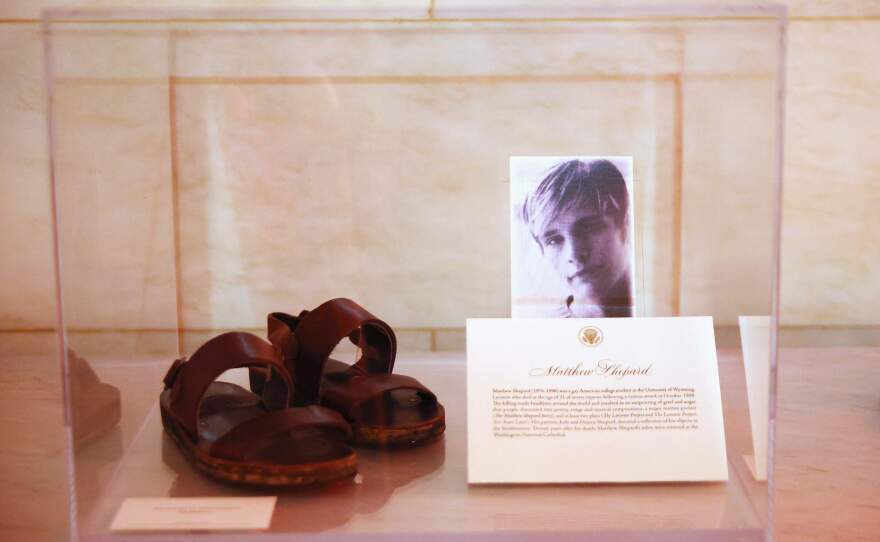A service commemorating the 25th anniversary of the death of Matthew Shepard is being held at Washington’s National Cathedral on Thursday night.
Shepard was a 21-year-old University of Wyoming student who was brutally assaulted and left to die because he was gay. His murder shocked the community of Laramie, Wyoming, and the world.
Rev. Anne Kitch, a relative of Shepard’s and an Episcopal priest, spoke at his funeral 25 years ago. She’s delivering a sermon at Thursday night’s service.
In it, she remembers carrying Shepard’s ashes to his funeral in Casper, Wyoming in 1998. She says homophobic protestors carrying hateful signs shouted at her and her family as they approached the church:
“25 years ago
I carried Matt’s ashes in my lap
as my spouse drove us to the church for the funeral
our one-year-old safely buckled into a car seat in the back
we turned a corner
and suddenly encountered hate
protesters shouting and wielding hateful signs
Matt’s face with ugly words
some of them carried by children
I instinctively shielded the precious burden in my lap
as I simultaneously threw a mother’s protective love
over our own child
not wanting a whisp of that hate to touch them
5 years ago
at this Cathedral
instead of hateful signs, the rainbow flag flew
our profound sorrow enfolded in profound love
and now, a return, a remembrance,
a time of pilgrimage.”
Shepard’s ashes were interred at Washington’s National Cathedral in 2018.
Shortly after Matthew Shepard’s death, his parents, Judy and Dennis Shepard, started a foundation to combat LGBTQ hate and violence in America. Kitch says with their foundation carrying the tagline “erase hate,” they have brought about great change.
But she says their efforts can’t slow down now.
“Sometimes I think we’ve made these huge steps and then sometimes I’m fearful for people that I know and care about and how it’s still dangerous to be someone ‘other’ in the world,” she says. “I think certainly in our society now there’s much hateful behavior, hateful speech, hateful language, particularly aimed at transgender folks and others. So, on the one hand, we’ve seen great strides with marriage equality — and even the Episcopal Church changed their own canons in 2015 to allow for same sex marriage —and then you see the pushback against that.”
Despite setbacks, Kitch’s faith in young generations’ more inclusive views remains strong.
“Younger people that I encounter in my work don’t think that we should be making so many restrictions against people for other reasons,” she says. “So I have to remain hopeful.
Adeline Sire produced and edited this interview for broadcast with Julia Corcoran. Sire also adapted it for the web.
This article was originally published on WBUR.org.
Copyright 2023 NPR. To see more, visit https://www.npr.org. 9(MDM3NjYwMjA5MDE1MjA1MzQ1NDk1N2ZmZQ004))


